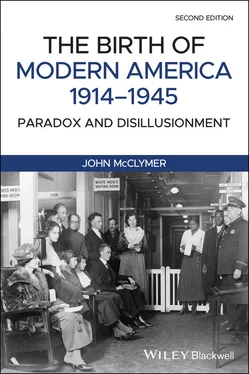What an extraordinary episode in the economic progress of man that age was that came to an end in August, 1914! The greater part of the population, it is true, worked hard and lived at a low standard of comfort, yet were, to all appearances, reasonably contented with this lot. But escape was possible, for any man of capacity or character at all exceeding the average, into the middle and upper classes, for whom life offered, at a low cost and with the least trouble, conveniences, comforts, and amenities beyond the compass of the richest and most powerful monarchs of other ages.1
More importantly, in Keynes’ opinion, Americans and western Europeans “regarded this state of affairs as normal, certain, and permanent, except in the direction of further improvement, and any deviation from it as aberrant, scandalous, and avoidable.” They believed in the inevitability of progress. In the United States, not only did political candidates claim to be “progressives,” so did businessmen and farmers.
Within a few years this complacency shattered. In 1913 the dissonance Igor Stravinsky employed in The Rite of Spring struck many listeners as barbaric. By 1918, it sounded prophetic. So too with the theories of Sigmund Freud and the fiction of Franz Kafka. Both proclaimed that humans were not the rational creatures pre‐war westerners imagined. They were instead driven by irrational drives and urges, as Freud claimed. And authorities behaved in the nightmarish fashion Kafka imagined.
Many people in the United States and western European countries had been highly self‐satisfied before the war. Collectively, these countries represented progress, enlightenment, and civilization. Or so most of their citizens thought.
Then came the war.
We can start our exploration of the impact of WWI with some numbers. France mobilized 8,410,000 men; 6,160,800 were killed, wounded, taken prisoner, or went missing in action. More than three in four, that is, were casualties. A nearly identical percentage of Russian soldiers met the same fates. Germany mobilized 11,000,000; 7,142,588 or almost two in three were killed, wounded, taken prisoner, or went missing in action. The proportion in the Austro‐Hungarian Empire was a daunting nine in ten. Is it any wonder that the Austro‐Hungarian Empire collapsed? As did the German Empire. And the Russian. And the Ottoman. Compared to these losses, the United States got off relatively easily. Nonetheless, 126,000 Americans died; another 234,300 were wounded. Only 4,500 were taken prisoner or went missing in action. For Europeans, the war eliminated an entire generation. For Americans, it was less traumatic but still deeply disillusioning.
WWI was a “Total War,” mobilizing civilians as well as the military. Modern technology produced new weapons of mass destruction: submarines, tanks, machine guns, airplanes, poison gas, and huge artillery pieces. It did not produce new strategies. Initially, everyone expected a short war because the most recent European conflict, the Franco‐Prussian War (1870), had been quite brief. Instead, WWI turned out to be like the first modern war, the American Civil War. On the eastern front, the German armies inflicted horrific losses upon the Russians but were unable to achieve a decisive victory until the Bolshevik Revolution of October 1917. Lenin took power on a promise of “Peace, Land, and Bread” and negotiated a separate peace with Germany in March of 1918.
On the western front the two sides literally dug in, in vast networks of trenches separated by a barren “no man’s land.” Each took turns attacking. The battles would begin with massive artillery bombardments intended to “soften up” the enemy. Then infantrymen would “go over the top” of their own trenches and charge across “no man’s land.” Machine gun fire cut them down like wheat. Thousands died in a morning or an afternoon. Soon enough the enemy would try the same thing. With the same results. The slaughter was as mindless as it was seemingly endless. As the war dragged on, people became ever more appalled.
When the new Soviet Union signed its “separate peace,” ending the war on the eastern front, Germany moved those armies to the western front for what turned out to be a final massive assault. American reinforcements helped defeat it. They and their British and French allies then forced the Germans into a long retreat. Finally, on November 11, 1918, its troops still occupying foreign territory, Germany signed the Armistice. The war was finally over.
You could not have appreciated the devastating cultural and psychological impacts of the war by listening to American popular music of the day. George M. Cohan wrote the great patriotic anthem of the war years, “Over There.” It began:
Johnnie, get your gun,
Get your gun, get your gun,
Take it on the run,
On the run, on the run.
Hear them calling, you and me,
Every son of liberty.
Hurry right away,
No delay, go today,
Make your daddy glad
To have had such a lad.
Tell your sweetheart not to pine,
To be proud her boy’s in line.
And ended with the triumphal chorus:
Over there, over there,
Send the word, send the word over there –
That the Yanks are coming,
The Yanks are coming,
The drums rum‐tumming
Ev’rywhere.
So prepare, say a pray’r,
Send the word, send the word to beware.
We’ll be over, we’re coming over,
And we won’t come back till it’s over
Over there.
Another big hit of the day was Irving Berlin’s “Oh, How I Hate to Get Up in the Morning,” from a show he wrote to raise money for Army recreation centers, Yip, Yip, Yaphank . Yaphank is a town on Long Island where Berlin did his basic training. He volunteered to serve despite his very poor eyesight that otherwise would have kept him out of the army. The song laments the early hour at which the new soldiers had to rise.
For the hardest blow of all
Is to hear the bugler call
Ya gotta get up
Ya gotta get up
Ya gotta get up this morning
Someday I’m going to murder the bugler
Someday they’re going to find him dead
I’ll amputate his reveille
And step upon it heavily
And spend the rest of my life in bed
It is worth emphasizing that George M. Cohan was an Irish Catholic and that Irving Berlin (born Israel Baline) was a Russian Jew. The war intensified anti‐Catholic, anti‐Semitic, anti‐black, and anti‐immigrant hatreds. But Catholics, Jews, immigrants, and blacks continued to help shape the popular culture. Lt. James Reese Europe and his Harlem Hellfighters Orchestra, for example, helped launch the popularity of jazz with their recording of “Memphis Blues.”
Despite the upbeat music, civilian populations had been called upon to make heroic sacrifices for the war effort, and some had been subject to bombardment. Virtually every commodity was rationed in every warring nation. Civilians were exposed to unrelenting propaganda that demonized the enemy and lionized “our boys.”
If the Wilson administration, like other governments, called on its citizens to rally ‘round the flag, it did nothing to tamp down rising racial, ethnic, and religious hatreds. Even those who thought of themselves as promoting true Americanism often made these hatreds more intense by treating Americanism as a zero‐sum process. That is, Americanizers usually insisted that immigrants give up their “foreign ways” even down to eating such “American vegetables” as peas instead of foreign vegetables like cabbage. Why anyone thought that peas were an American vegetable remains a mystery.
Читать дальше












